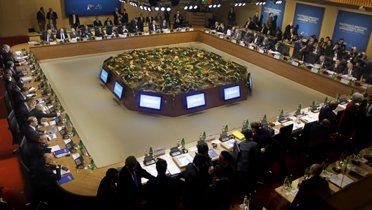Global interdependence has increased in many domains, such as the spread of infectious disease, nuclear threats, climate change and the management of the global economy. In each area, there exist large spillover effects across national borders that have prompted efforts to come up with globally coordinated solutions. In the economic domain, some of these efforts have either been enshrined in legally binding treaties, as in the case of trade rules that the Word Trade Organization has been set up to provide and enforce, or conventions and norms for behavior as in the case of the Basel Committee guidelines for the banking sector or rules relating to health issues coordinated by the World Health Organization.
The great financial crisis of 2008 and the ensuing recession that hit large parts of the world economy highlighted the importance of macroeconomic and financial stability as global public goods. Financial problems are highly contagious in a world where financial institutions have become global and systemically important, where capital flows move back and forth in huge amounts across borders, and where derivatives of various sorts tie markets together in novel ways that always seem one step ahead of regulatory authorities. The recession also highlighted the importance of coordinated global demand management through fiscal and monetary responses to the global downturn and, more broadly, of the need to buttress global confidence in the system and avoid self-reinforcing downward spirals.
The International Monetary Fund has long attempted to encourage macroeconomic policy coordination through some form of multilateral surveillance, as well as global forecasts and research on global economic issues. At the IMF, there is also a long tradition of promoting the development of prudential standards for the financial sector or prescriptions for prudent fiscal policy. Until recently, however, member states have not given strong support to the multilateral dimension of these efforts.
The 2008 crisis pointed to the deficiencies in the institutional arrangements for dealing with financial crises and global macroeconomic interdependence. With regard to the financial sector, the Financial Stability Forum has been expanded and transformed into the Financial Stability Board (FSB), and working with the IMF and the Group of Twenty (G-20), it is to provide global rules for regulating the financial sector. While much still needs to be done, the framework for tackling the issues appears set in place. The same cannot be said for managing global macroeconomic interdependence, or what is often somewhat loosely called “global macroeconomic imbalances”. Until 2009, the efforts by the IMF to strengthen its multilateral surveillance processes did not in the past receive the needed degree of support from shareholders. But the G-20 did decide at the Pittsburgh Summit in the fall of 2009 to deal with macroeconomic policy interdependence through a new Mutual Assessment Process involving member nations, with a facilitating role for the IMF. That, broadly, is the topic of the collection of short essays in this volume.
Macroeconomic Policy Interdependence and Developing Countries: Is Mutual Assessment for Members Only?
Global Imbalances, Spillover Effects and External Monitoring: Some Indian Perspectives
Macroeconomic Policy Coordination and the Generation of World Effective Demand
Financial Globalization and Macroeconomic Policy Coordination
The Global Rebalancing and Growth Strategy Debate
Enhancing Global Coordination
Downloads:
Corporate Governance of the World’s Financial System: Extend the Financial Regulation Franchise to Emerging Economies
Macroeconomic Policy Coordination: Reducing External Imbalances and Difficulties and Inducing Cooperative Behavior
How to Formulate Guidelines for Macroeconomic Indicators
Concrete Steps toward Realistic Reforms of the International Monetary System
Introduction: Macroeconomic Policy Interdependence and the G-20
World Inflation: A New Challenge for the G-20
Defining an Asian Agenda in the G-20
Downloads:
Inconvenient Asymmetries
Downloads:
Understanding Global Interdependencies: The Contribution of Economic Models
Multilateral Surveillance and Macroeconomic Policy Coordination: Designing an Appropriate Framework
Downloads:



